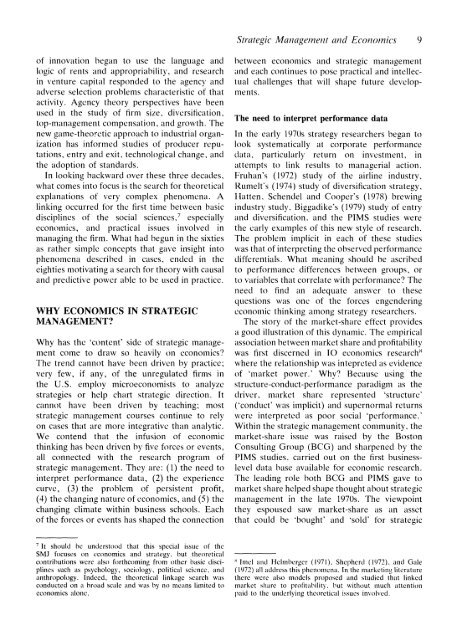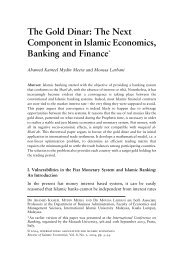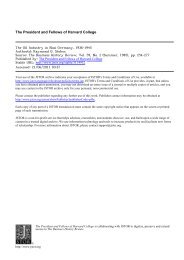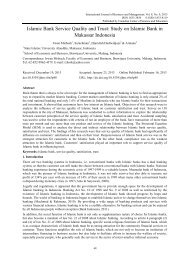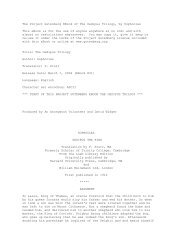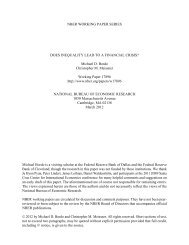Strategic Management and Economics
Strategic Management and Economics
Strategic Management and Economics
You also want an ePaper? Increase the reach of your titles
YUMPU automatically turns print PDFs into web optimized ePapers that Google loves.
of innovation lbegain to ulse the laIngUage anid<br />
logic of r ents <strong>and</strong> appropriability, atnd research<br />
in veniture capital responcded to the agency <strong>and</strong><br />
adverse selectioni problems characteristic of that<br />
activity. Agency theory perspectives have been<br />
tised in the study of firm size, diversification,<br />
top-management compensation, <strong>and</strong> g,rowth. The<br />
new giame-thleoretic approach to industrial organizationi<br />
has inforined stucdies of prodLicer repLltations,<br />
enitry <strong>and</strong> exit, technological chainge, <strong>and</strong><br />
the adoptioi of st<strong>and</strong>ard s.<br />
In looking backwarcl over these three decadles,<br />
what comes into focus is the search for theoretical<br />
explanations of very complex plheionoienia. A<br />
linking occur-red for the first time betweeni basic<br />
discipliines of the social sciences,7 especially<br />
economics, annd practical issuLes involvedl in<br />
managing the firm. What had begun in the sixties<br />
as rather simple concepts that gave insight into<br />
phenomena described in cases, einlded in the<br />
eighties motivatiing a search for theory withl caLusal<br />
<strong>and</strong> predictive power able to be uLsed in practice.<br />
WHY ECONOMICS IN STRATEGIC<br />
MANAGEMENT?<br />
Whv has the 'content' side of strategic mainage-<br />
meint come to draw so heavily on economiiics'?<br />
The trenid cannot have beeni drivcie by practice;<br />
very few, if any, of the unregulated firms in<br />
the U.S. emplov microeconomists to analyze<br />
strategies or help chalrt strategic clirection. It<br />
cannot have been driven by teaching; Imlost<br />
stritegic manaigement courses; contilnue to rely<br />
on cases that are more integrative thain analytic.<br />
We contend that the infusioni of economic<br />
thinking has been dcriven by five forces or events,<br />
all connlected with the research program of<br />
strategic management. They are: (1) the need to<br />
interpret performance data, (2) the experience<br />
curve, (3) the problem of persistenit profit,<br />
(4) the chaniginig natture of economics, <strong>and</strong> (5) the<br />
changing climate within business schools. Each<br />
of the forces or events has shaped the conniectioni<br />
7 It shouli be understood thait this special issule of' the<br />
SMJ focuses on economics <strong>and</strong> strategy. but theoretical<br />
contributions were ailso forthcoming from other basic disci-<br />
plines suclh as psychology, sociology, political science, atid<br />
anthropology. Indeed, the theoretical linkage seairch was<br />
conidlucted oni a broad scale anld was by nio micans limiiited to<br />
economiiics alone.<br />
<strong>Strategic</strong> Managemiientt anid <strong>Economics</strong> 9<br />
between ecoifloics <strong>and</strong> strategic imiaInalgement<br />
<strong>and</strong> each continues to pose practical <strong>and</strong> intellec-<br />
tUal challenges that will shape fututre dlevelop-<br />
meints.<br />
The need to interpret performance data<br />
In the early 1970s strategy researchers began to<br />
look systematically at corporate performance<br />
data, particUlarly retuLrin oni inivestimient, in<br />
attempts to link results to mianagerial action.<br />
FrUllhans (1972) study of the airline iniduLstry.<br />
Rulmiielt's ( 1974) stuLdy of diveisificatioin strategy,<br />
liattei, Scheindlel aiid Cooper's (1978) brewinig<br />
industrx stuLdyV Biggadike's (1979) studCy of enitirv<br />
<strong>and</strong> diversificatioi, aind the PIMS studies were<br />
the early examples of this inew style of reseairch.<br />
IThe problem im)plicit in each of these studies<br />
was that of interpretiing the observed performance<br />
differentials. What meaning shouLld be ascribed<br />
to perforImaiince differenices between groups, or<br />
to vatriables that correlate with performance? The<br />
needl to find an adeqUate answer to these<br />
(qLlestiols wais one of the forces engenderiing<br />
econoimlic thiinkiing aimloing straltegy researchers.<br />
The story of the market-share effect provides<br />
ai goocl illustration of this dynamic. The empirical<br />
association tbetween mailrket shalre aind profitability<br />
was first discernedl in 10 ecoinomics research8<br />
where the relatioIslhip was intepretedl as evidence<br />
of 'minarket poNwer.' Why? I3ecatuse using the<br />
structuLre-coniduLct-performaince paradigm as the<br />
dlriver, market share representedl structUre<br />
('conduct' was imiiplicit) <strong>and</strong> supernormal returins<br />
wZere interpretedl ais poor social 'performance.'<br />
Within the strategic mianagemnent comImunity, the<br />
market-share isstue was raised by the Boston<br />
Consultiing Group (BCG) aind sharpeniedl by the<br />
PINIS studies. carried out onl the first businesslevel<br />
data base available for ecoilomilic r-eseairch.<br />
The leading role both BCG aindl PIMS gave to<br />
market share helped shape thought about strategic<br />
nImainageni ent in the late 1970s. The viewpoint<br />
they espoused saw imarket-share ais an aIsset<br />
that could be 'btought' anid 'sold' for strategic<br />
I Imiiel <strong>and</strong> I-Ileliiberger (1971). Shepherd (1972), <strong>and</strong>ci Gaile<br />
(1972) all address this phenloeilenai. In the miarketine literaiture<br />
therc were also models proposed aind studied that linked<br />
market share to profitability. h-ut without Ilmuch attention<br />
paid to the underlyinig theoretical issues involved.


